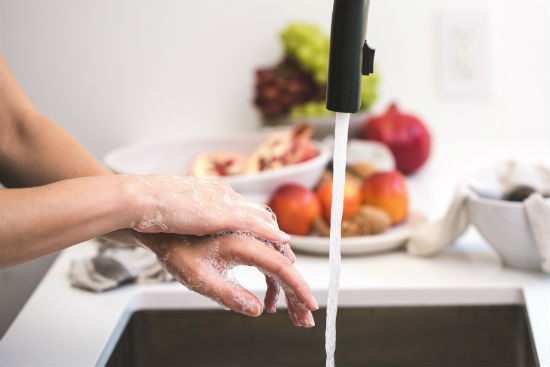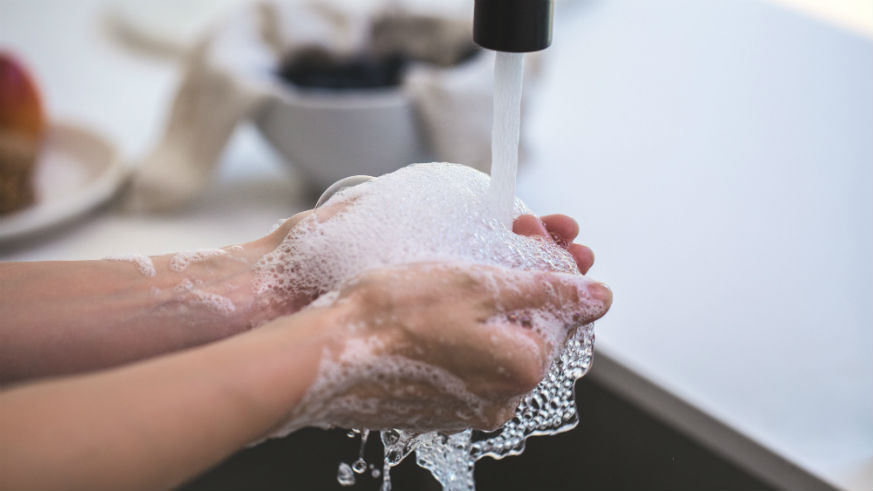Do you wash your hands correctly? According to a recent study conducted by the U.S. Department of Agriculture (USDA), probably not.
The study was based on monitoring 383 participants in test kitchens while they cooked, according to USA TODAY. Results revealed that people failed to follow the necessary steps to wash their hands 97 percent of the time.
The most common mistake was not washing their hands for long enough. Many consumers in the study also didn’t dry their hands with a clean towel.
“You can’t see, smell or feel bacteria,” Carmen Rottenberg, USDA acting deputy under secretary for food safety, said in a news release. “By simply washing your hands properly, you can protect your family and prevent that bacteria from contaminating your food and key areas in your kitchen.”
We’ve complied the best tips on the right way to wash hands — because, even if you rehearsed this from the time you were a toddler, a refresher (clearly) wouldn’t hurt.
And, with an estimated 48 million Americans affected by foodborne illnesses each year — resulting in 3,000 deaths — this basic information could be lifesaving.
Properly lather and scrub your hands
The following are the five basic steps you need to take when you wash your hands, according to the CDC: wet, lather, scrub, rinse and dry.
You can use warm or cold water, but make sure it’s clean.
Dr. Danh Ngo with Medical Offices of Manhattan told Metro that it’s important to remember “vigorous hand scrubbing and washing or a proper amount of alcohol based hand sanitizer to effectively clean our hands.”
“To avoid improper hand washing, make it a habit to rub and scrub between your fingers, under your nails, at least up to your wrist,” Dr. Ngo says, and also scrub any visible stains.
“In our busy, hectic and close-quartered lives, we come into contact with numerous pathogens daily that can be potentially detrimental to our health,” he says. “Prevention is a cornerstone of medicine, and proper hand hygiene is simple and effective to help us avoid illnesses.”
Wash your hands for at least 20 seconds
The CDC recommends washing your hands for 20 seconds. Or, you can simply hum the “Happy Birthday” song twice (sound familiar?).
“You can liven things [up] and avoid not washing long enough by singing your favorite song or chorus” for the recommended period of time, Dr. Ngo suggests.
Use the right soap to wash your hands
“In terms of soaps, at this point, we recommend using any kind that does not aggravate your skin,” Dr. Ngo says. “There was a recent pilot study that described foam-aerosolized soaps as being less effective, but the study was very limited, and for general hand washing purposes, any soap should readily suffice with proper technique.”
He does add, however, that foam soap can contain “less soap overall due to the air bubbles, so you may consider using more than one pump for a better lather.”

Use a clean towel after you wash your hands
Having a clean towel to dry your hands is important — if you dry them on a dirty towel, you could spread bacteria. (Plus, that’s reversing the steps you took to wash your hands in the first place.)
In public facilities, you can even use a clean towel to shut off the faucet and open the door, and Dr. Ngo says that, “in your own kitchen or bathroom, you will need to be diligent and have clean towels available.”
Medical Offices of Manhattan recommends that people wash their kitchen and bath towels after every use, “but at least three to four times per week depending on how soiled they are. Kitchen towels are a sneaky but common method for exposure to pathogens, especially fecal-oral bacteria that can cause nasty gastrointestinal issues.”
If you can’t wash your towels this frequently, Dr. Ngo suggests soaking them in “a diluted bleach solution or vinegar, then rinsing to help keep them cleaner for longer.”
Wash your hands the right way because, as Dr. Ngo stresses, “proper hand hygiene is very effective at protecting our health.” That’s a fact.


























